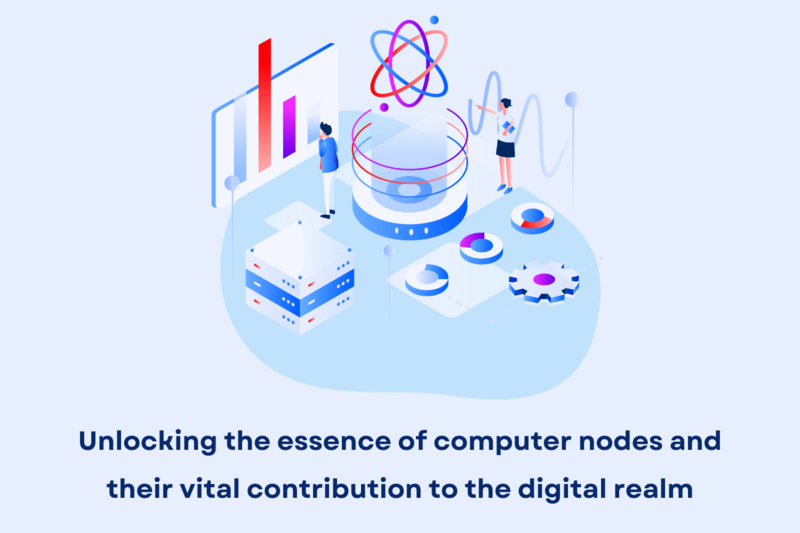In the vast landscape of information technology and networking, the concept of a "node" is a fundamental building block. To embark on our journey of exploring the intricate world of network nodes, it's crucial to start from the basics. In this introduction, we will answer the following questions:
What is a Node?

A node, in the context of networking and computing, is a crucial point or juncture within a more extensive system. Consider it a vital connection point, like a nexus that facilitates data flow, information, or resources. Nodes come in various forms and can be found in different settings, including computer networks, the internet, and beyond.
Understanding what a node is forms the foundation of comprehending how networks operate and are structured. Whether you're a novice in the IT world or a seasoned professional, a clear understanding of nodes is essential for navigating the complex web of modern connectivity.
Definition of a Node
To dive even more deeply, let's establish a precise definition of a node. In IT, a node is typically defined as a discrete device or an individual connection point within a network. It can be a computer, a router, a switch, or any other hardware component that plays a role in transmitting, receiving, or processing data.
Nodes, when interconnected, create the intricate networks that drive our modern world. The connections between these nodes form the backbone of the internet, intranets, and local area networks (LANs), enabling seamless communication and data exchange.
What is a Node in Networking
To round off our introduction, we'll address the specific relevance of nodes in networking. In networking, nodes are the essential building blocks for establishing and maintaining connections. They participate in the routing of data packets, ensuring that information is delivered from one point to another efficiently and reliably.
Understanding the role of nodes in networking will provide valuable insights into how the digital world remains interconnected, making this knowledge crucial for anyone interested in the IT field or simply curious about the inner workings of the internet.
As we continue our exploration of network nodes, we will delve deeper into their significance and various applications, uncovering how these unassuming components play a pivotal role in our interconnected world.
Understanding Nodes
As we venture deeper into our exploration of the intricate world of network nodes, it's essential to gain a comprehensive understanding of these fundamental components that underpin modern connectivity. In this section, we'll unravel the core concepts surrounding nodes, addressing key questions such as:
What Are Nodes?
Nodes are the unsung heroes of networked systems, serving as the pivotal points that enable the flow of information. They come in various forms, each tailored to its specific function within a network. Whether it's a computer, a server, a switch, a router, or a device capable of sending, receiving, or processing data, all are considered nodes in the grand networking scheme. Understanding the diverse roles nodes play is essential for comprehending how data is transmitted, shared, and processed within networks.
What Does Node Mean?
The term "node" can have different meanings in computing, networking, and technology. Beyond its definition as a network component, "node" can also refer to a point of connection or a central location for data exchange. It symbolizes the core of interconnectedness, making it a vital concept in the digital realm.
Node Meaning in Computer
In computer science, a node can refer to a data structure element within various algorithms and data storage systems. Understanding the role of nodes in computer science is crucial for grasping the concepts of data structures, such as trees and linked lists. These data structures rely on nodes to store and organize data efficiently, making it an integral part of software development and information processing.
Node in Computer Science
Node-based structures are prevalent in computer science, and they play a central role in algorithms and programming. Nodes represent and organize data within various formats, from binary trees to linked lists. In computer science, the node concept is fundamental for building efficient and organized software systems.
As we delve deeper into the intricate world of network nodes, understanding these core concepts is a vital stepping stone. It allows us to appreciate the significance of nodes in various IT contexts, including networking, computer science, and data management.
Network Nodes
Network nodes, in the context of networking, are the essential components that form the structure of a network. These can include routers, switches, hubs, and any device responsible for routing data packets, managing traffic, and ensuring seamless communication between interconnected devices. Network nodes play a critical role in maintaining the integrity and efficiency of data transmission within a network.
Internet Node
The global internet is a vast network of interconnected nodes, each playing a unique part in the worldwide web. Internet nodes can be data centers, servers, or network equipment dispersed globally. They work together to facilitate the exchange of information between users, ensuring that your data can travel from your device to its destination, no matter where it may be.
Nodes in Computers
 In our quest to unravel the intricate world of network nodes, we now focus on the specific roles and significance of nodes in the realm of computers. Understanding how nodes function within computer systems, programming, and computer science is crucial for grasping their broader implications. In this section, we will explore the following aspects:
In our quest to unravel the intricate world of network nodes, we now focus on the specific roles and significance of nodes in the realm of computers. Understanding how nodes function within computer systems, programming, and computer science is crucial for grasping their broader implications. In this section, we will explore the following aspects:
What Is a Computer Node?
A computer node refers to a fundamental unit within a computer network. It can be a server, a workstation, a desktop computer, or any device that is part of a network. These nodes are responsible for executing tasks, processing data, and enabling communication within the network. They are the workhorses that collectively ensure the smooth operation of an interconnected system.
What Is a Node in Programming
In the programming world, the node concept takes on a different dimension. Nodes represent fundamental elements within data structures, such as linked lists, trees, or graphs. They serve as data points or building blocks for organizing and managing information efficiently. Understanding nodes in programming is essential for developing algorithms, data-driven applications, and software solutions.
Node in CS
Computer Science (CS) is a field where nodes play a pivotal role. In computer science, nodes are essential to various algorithms, data structures, and network design. They facilitate the flow of information, the organization of data, and the execution of computational tasks. Whether designing efficient data structures or optimizing network configurations, a solid grasp of nodes in computer science is indispensable.
Computer nodes are not limited to hardware devices; they extend into the software and algorithmic domains, intertwining technology and programming. They form the foundational blocks of our digital world, from the hardware that powers our devices to the software that drives our applications and networks.
Advanced Node Concepts
As we delve deeper into our exploration of the intricate world of network nodes, we now focus on advanced node concepts that play a pivotal role in modern networking and information technology. These concepts shed light on the evolving nature of nodes and their applications. In this section, we will explore the following key aspects:
What Is a Node on a Network
Understanding the intricacies of a node on a network takes us beyond the basic definition. In advanced node concepts, a network node can encompass various components, including routers, switches, gateways, and more. These nodes are responsible for intricate tasks such as routing data, managing network traffic, and ensuring the secure and efficient flow of information. This knowledge is essential for professionals in network administration and anyone looking to grasp the intricacies of network architecture.
Nodes in Server

Server environments are at the core of data processing and storage in the digital age. Nodes in server configurations are vital players in managing data, applications, and services. These nodes can include physical servers, virtual machines, and cloud-based instances. Understanding the role of nodes in server environments is essential for IT professionals, system administrators, and businesses aiming to maintain robust and reliable data centers.
Advanced node concepts elevate our understanding of how these critical components influence the modern digital landscape. They play a central role in data transmission, network infrastructure, and the reliability of online services.
In the subsequent sections of our exploration, we will continue to delve into advanced node concepts, exploring their diverse applications and their impact on the ever-evolving world of technology.
Newsletter to recieve
our latest company updates
Comment